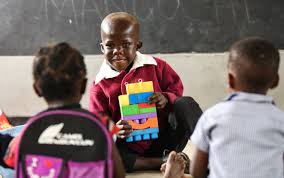
Navigating Children’s Online World: A Guide for Parents
The Impact of Children’s Online Activities
Children today are growing up in a digital world, where the internet and online activities play a significant role in their lives. While the internet offers numerous benefits, it also poses risks that parents and caregivers need to be aware of.
One of the positive aspects of children’s online activities is the access to vast amounts of information and educational resources. The internet can be a valuable tool for learning, allowing children to explore new ideas, cultures, and perspectives from the comfort of their own homes.
However, excessive screen time and unrestricted access to online content can have negative consequences on children’s development. Studies have shown that prolonged use of digital devices can impact children’s physical health, mental well-being, and social skills.
It is essential for parents to monitor their children’s online activities and set boundaries to ensure a healthy balance between screen time and other activities. Encouraging outdoor play, creative pursuits, and face-to-face interactions can help mitigate the negative effects of excessive screen time.
Furthermore, educating children about online safety and responsible internet use is crucial in today’s digital age. Teaching them about privacy settings, safe browsing habits, and how to identify potential risks online can empower them to navigate the digital world safely.
In conclusion, while children’s online activities offer many benefits, it is important for parents and caregivers to be vigilant about monitoring their children’s screen time and guiding them towards responsible internet use. By striking a balance between offline and online activities, we can help children reap the benefits of technology while safeguarding their well-being.
Six Essential Tips for Ensuring Children’s Online Safety
- Set parental controls on devices and apps to restrict inappropriate content.
- Teach children about online safety, such as not sharing personal information with strangers.
- Encourage open communication with your child about their online activities.
- Monitor your child’s online behaviour and screen time.
- Educate children on cyberbullying and how to deal with it.
- Lead by example by demonstrating responsible internet use.
Set parental controls on devices and apps to restrict inappropriate content.
To safeguard children’s online experiences, it is advisable to set parental controls on devices and apps to limit access to inappropriate content. By implementing these restrictions, parents can create a safer digital environment for their children, ensuring that they are not exposed to harmful or unsuitable material while using electronic devices. Parental controls offer a proactive approach to managing children’s online activities and help parents have peace of mind knowing that their children are browsing the internet in a secure and age-appropriate manner.
Teach children about online safety, such as not sharing personal information with strangers.
It is crucial to educate children about online safety, including the importance of not sharing personal information with strangers. By teaching children to be cautious about what they share online, we can help protect them from potential risks and dangers on the internet. Encouraging them to keep personal details private and to only interact with people they know in real life can empower them to navigate the digital world safely and responsibly.
Encourage open communication with your child about their online activities.
Encouraging open communication with your child about their online activities is crucial in fostering a safe and healthy relationship with technology. By creating a supportive environment where children feel comfortable sharing their online experiences, parents can better understand their child’s digital habits and address any potential concerns or risks. Open dialogue allows for guidance on responsible internet use, setting boundaries, and navigating online challenges together, ultimately empowering children to make informed decisions and stay safe in the digital world.
Monitor your child’s online behaviour and screen time.
It is crucial for parents to monitor their child’s online behaviour and screen time to ensure a safe and balanced digital experience. By keeping a close eye on the websites they visit, the content they engage with, and the amount of time spent online, parents can help protect their child from potential risks and promote healthy screen habits. Regularly checking in with your child about their online activities also provides an opportunity for open communication and guidance on responsible internet use. By staying vigilant and involved, parents can support their child in navigating the digital world safely and responsibly.
Educate children on cyberbullying and how to deal with it.
It is crucial to educate children about cyberbullying and equip them with the necessary skills to deal with it effectively. Cyberbullying can have serious consequences on a child’s mental health and well-being, making it essential for children to understand what it is and how to respond if they experience or witness it. Teaching children about the importance of kindness, empathy, and respect online can help create a safer digital environment where they feel empowered to stand up against cyberbullying and seek support from trusted adults when needed.
Lead by example by demonstrating responsible internet use.
It is crucial for parents to lead by example when it comes to demonstrating responsible internet use to their children. By modelling safe and mindful online behaviours, such as respecting privacy settings, verifying information before sharing, and engaging in positive online interactions, parents can instil good habits in their children. Children learn best through observation and emulation, so showing them how to navigate the digital world responsibly sets a strong foundation for their own online conduct.



